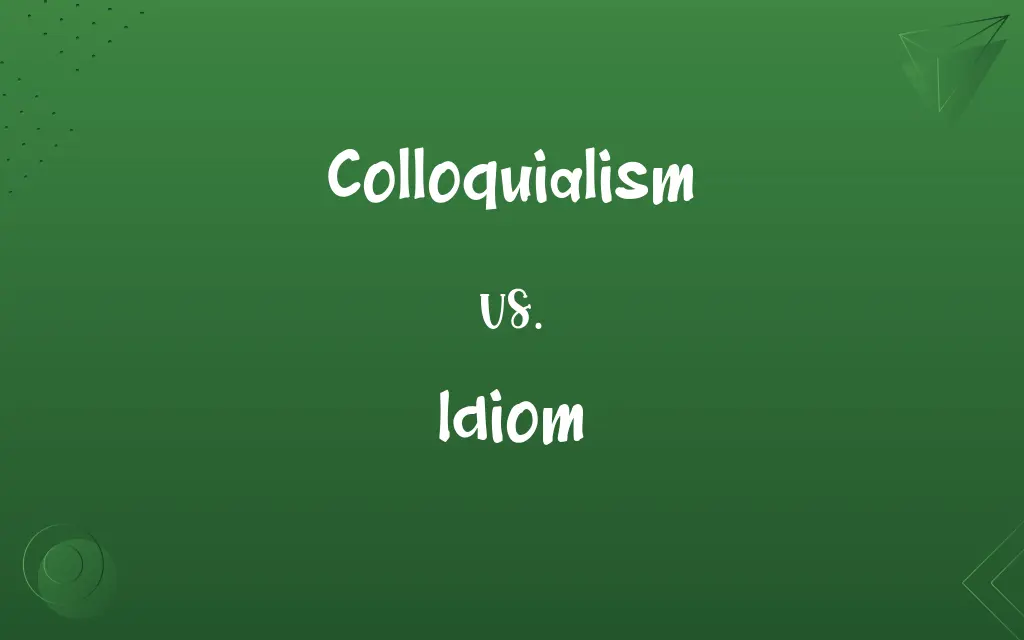Colloquialism vs. Idiom: Know the Difference

By Hifza Nasir & Dua Fatima || Published on April 30, 2024
Colloquialisms are informal words or expressions used in everyday speech, while idioms are phrases with meanings not deducible from the individual words.

Key Differences
Colloquialisms are informal terms or expressions that characterize everyday spoken language. Idioms, on the other hand, are phrases whose meanings cannot be understood from the literal interpretation of the words that comprise them.
Dua Fatima
Apr 30, 2024
Colloquialisms vary regionally and are often used in casual conversations, reflecting the social and cultural context of a specific area. Colloquial language might include slang, but it primarily consists of informal phrases and words accepted in general speech. Idioms express a particular sentiment or concept unique to a language and are used both in spoken and written language, transcending formal and informal contexts. The meaning of an idiom is established by usage and understanding within a linguistic community.
Hifza Nasir
Apr 30, 2024
While colloquialisms serve to make speech more relatable and less formal, idioms enrich the language by adding figurative or symbolic meanings to expressions. For example, "gonna" (going to) is a colloquialism simplifying speech, whereas "kick the bucket" is an idiom with a meaning not predictable from its words.
Hifza Nasir
Apr 30, 2024
The use of colloquialisms can indicate the speaker's geographical or social background, as they often include regional dialects or vernacular. Idioms, however, are widely recognized within a language and may not necessarily reveal specific regional characteristics.
Hifza Nasir
Apr 30, 2024
Understanding the difference between colloquialisms and idioms is crucial for language learners, as it aids in grasping the nuances of a language. Knowing when to use colloquial language and idioms can significantly impact the clarity and appropriateness of communication, especially in diverse linguistic settings.
Dua Fatima
Apr 30, 2024
ADVERTISEMENT
Comparison Chart
Definition
Informal words or expressions used in everyday speech
Phrases with meanings not deducible from the individual words
Dua Fatima
Apr 30, 2024
Context
Casual conversations, reflecting social and cultural contexts
Both spoken and written language, formal and informal contexts
Hifza Nasir
Apr 30, 2024
Purpose
To make speech more relatable and less formal
To add figurative or symbolic meanings to expressions
Hifza Nasir
Apr 30, 2024
Examples
"gonna" for "going to", "y'all" for "you all"
"Kick the bucket" for "to die", "Piece of cake" for "very easy"
Hifza Nasir
Apr 30, 2024
Regional Variance
Often varies regionally and includes dialects
Widely recognized within a language, not necessarily regional
Hifza Nasir
Apr 30, 2024
ADVERTISEMENT
Formality
Generally considered informal
Can be used in both formal and informal contexts
Shumaila Saeed
Apr 30, 2024
Linguistic Complexity
Simplifies speech
Enriches language with figurative meaning
Hifza Nasir
Apr 30, 2024
Colloquialism and Idiom Definitions
Colloquialism
Everyday language.
Wanna grab a bite? uses wanna as a colloquialism for want to.
Dua Fatima
Mar 02, 2024
Idiom
Used across contexts.
Break the ice means to initiate conversation, suitable in formal and informal settings.
Hifza Nasir
Mar 02, 2024
Colloquialism
Reflects regional speech.
I'm fixin' to go is a Southern U.S. colloquialism meaning I'm preparing to go.
Hifza Nasir
Mar 02, 2024
ADVERTISEMENT
Idiom
Not deducible from words.
Piece of cake means very easy, unrelated to cake.
Dua Fatima
Mar 02, 2024
Colloquialism
Used in casual settings.
He's outta here uses outta for out of in an informal context.
Hifza Nasir
Mar 02, 2024
Idiom
Expresses unique concepts.
Let the cat out of the bag for revealing a secret.
Hifza Nasir
Mar 02, 2024
Colloquialism
Simplifies expressions.
Gonna for going to makes speech more relatable.
Dua Fatima
Mar 02, 2024
Idiom
Enhances linguistic richness.
Hit the nail on the head accurately describes making an exact point.
Shumaila Saeed
Mar 02, 2024
Colloquialism
Indicates social background.
Y'all as a colloquialism for you all suggests a Southern U.S. origin.
Hifza Nasir
Mar 02, 2024
Idiom
A speech form or an expression of a given language that is peculiar to itself grammatically or cannot be understood from the individual meanings of its elements, as in keep tabs on.
Hifza Nasir
Mar 01, 2024
Idiom
The specific grammatical, syntactic, and structural character of a given language.
Hifza Nasir
Mar 01, 2024
Idiom
A style of artistic expression characteristic of a particular individual, school, period, or medium
The idiom of the French impressionists.
The punk rock idiom.
Hifza Nasir
Mar 01, 2024
Colloquialism
A colloquial expression, not employed in formal discourse or writing.
Hifza Nasir
Mar 01, 2024
Idiom
The style of a particular artist or school or movement;
An imaginative orchestral idiom
Hifza Nasir
Mar 01, 2024
Colloquialism
A colloquial expression; characteristic of spoken or written communication that seeks to imitate informal speech
Shumaila Saeed
Mar 01, 2024
Idiom
An expression whose meanings cannot be inferred from the meanings of the words that make it up
Shumaila Saeed
Mar 01, 2024
Repeatedly Asked Queries
Are colloquialisms accepted in formal writing?
Generally, colloquialisms are avoided in formal writing to maintain a professional tone.
Hifza Nasir
Apr 30, 2024
Can idioms be translated literally into other languages?
Idioms often lose their meaning when translated literally, making it important to understand their figurative sense in the original language.
Dua Fatima
Apr 30, 2024
Why is understanding regional colloquialisms important?
It aids in better communication and understanding of cultural nuances when interacting with speakers from different regions.
Hifza Nasir
Apr 30, 2024
Is it possible to use idioms incorrectly?
Yes, using an idiom incorrectly can lead to misunderstandings, as their meanings are not deducible from the literal words.
Shumaila Saeed
Apr 30, 2024
Why are idioms important in language?
Idioms add depth and richness to a language, allowing speakers to express ideas in a more vivid and culturally specific way.
Hifza Nasir
Apr 30, 2024
How do colloquialisms affect language learning?
They can both enrich the learning experience by providing cultural insights and pose challenges due to their informal and regional nature.
Hifza Nasir
Apr 30, 2024
How do colloquialisms and idioms reflect culture?
They encapsulate cultural references, humor, and values, offering insight into the social and cultural fabric of a community.
Hifza Nasir
Apr 30, 2024
Can colloquialisms become idioms and vice versa?
While their functions differ, colloquial expressions can evolve into idioms if their usage becomes figurative over time.
Dua Fatima
Apr 30, 2024
How can I learn idioms effectively?
Exposure to the language in various contexts, such as literature, media, and conversation, helps in understanding and using idioms.
Dua Fatima
Apr 30, 2024
Do all languages have idioms and colloquialisms?
Yes, all languages have forms of idioms and colloquialisms, reflecting their unique cultural and social contexts.
Dua Fatima
Apr 30, 2024
Share this page
Link for your blog / website
HTML
Link to share via messenger
About Author
Written by
Hifza NasirCo-written by
Dua Fatima







































































